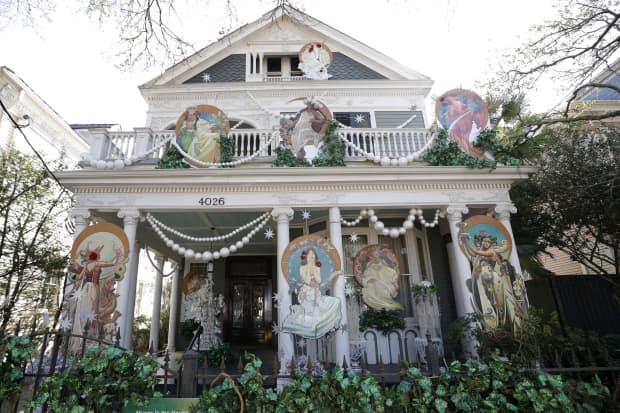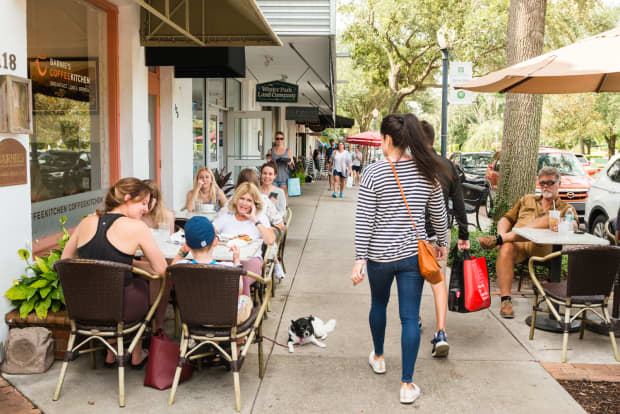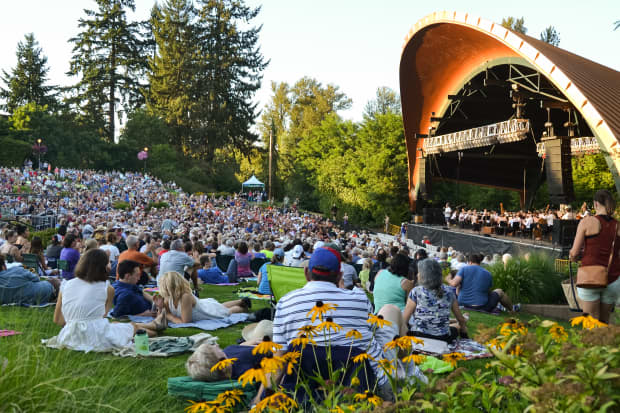This post was originally published on this site
Dear MarketWatch,
I’m almost 60, and my wife and I are looking to buy a townhouse or condo in which to retire (minimal maintenance!). We’d like to find a lakefront place in a city where it doesn’t usually get below freezing, has an urban feel with walkability to stores and restaurants, a university/college, good hospitals, museums, theaters and live music venues. Ideally, it would have a liberal mind-set with a sense of community. We’ve always thought Burlington, Vt., would be ideal — if it were just 700 miles further south.
Right now we are living in Washington, D.C., which could also be great, but gets colder than we’d like during the winter months and has a large transient population that comes and goes with political administrations or military tours of duty. When we sell our house of 30 years, we should have about $1 million to spend on housing (thank you, real estate boom of the early aughts!).
What do you think?
Scott
Dear Scott,
A warm-weather lakefront university town with an urban feel is a tall order. But either a home facing a lake or the college town with an urban feel? Doable.
Now, if you’re willing to live with a view of a river instead of a lake, you have far more options. Knoxville and Memphis, if Tennessee appeals, for example. If you want the lake but are willing to drive into the city for urban amenities, you could start with the many lake communities outside Charlotte N.C., particularly Davidson, which is home to Davidson College. (I’ve suggested all of these in other articles.)
If a small (man-made) lake is acceptable, pick your favorite cities and look in newer neighborhoods. You can also screen for “waterfront” in online listings, such as those on Realtor.com (which, like MarketWatch, is owned by News Corp.).
Read: Here’s how you can save money on capital-gains taxes when you sell your home
A few tips from Jeff Speck, a city planner who advocates for more walkable cities and whose books include “Walkable City; How downtown can save America, one step at a time”: Cities built before the Great Depression generally provide the walkability you want. But we all know that they, too, have expanded since World War II, and the newer sections have lost some of that walkability. So the neighborhood is even more important than the city.
Use WalkScore numbers to help gauge walkability. WalkScore, owned by Redfin, calculates just how walkable a neighborhood or community is, though of course you always want to verify its findings.
If you are looking at newer neighborhoods, you may want to look for “new urbanism” developments. This is a philosophy of designing walkable neighborhoods, with housing and shopping in close proximity.
And there is this radical thought: downsize in D.C., which you seem to like aside from winters, and use January and February to escape the cold and explore the world. Let the condo association deal with snow shoveling. Washington’s WalkScore of 76 is hard to beat. Indeed, Miami is the only warmer big city that does, with a WalkScore of 78.
If you’ve got your heart set on somewhere warmer than D.C., here are a few suggestions to get you started:
New Orleans

When COVID-19 canceled Mardi Gras parades in 2021, some decorated houses as Mardi Gras floats.
Getty Images
Urban, multicultural, walkable, water, college (Tulane University). Lake Pontchartrain if the Mississippi River isn’t your thing. Music galore. Theater too, including touring Broadway shows. More than 135 festivals every year, headlined of course by Mardi Gras. Foodie heaven. Museums — the National World War II Museum ranks first on Trip Advisor, and opening in 2021 is the Museum of the Southern Jewish Experience. Historic homes and neighborhoods. Medical care? University Medical Center – New Orleans is a Level 1 trauma center.
Need I say more?
New Orleans, with about 390,000 residents, has an overall WalkScore of 59, or the same as Burlington, Vt.; the only community in Louisiana that rates better is Gretna, on the west bank of the Mississippi and just east and across the river from uptown New Orleans, with 64. Nearly 18,000 people live there.
Yes, it gets humid. Extreme summer humidity is the tradeoff for no snow (though it’s a touch less humid than Miami). Yes, there is the risk of hurricanes, as is the case in Miami.
The median list price for a New Orleans home in February 2021 was $319,000, according to Realtor.com, less than the median list price in Miami. Here’s what’s on the market now.
Winter Park, Florida

Downtown Winter Park.
Getty Images
The upscale city of 30,000 northwest of Orlando is full of lakes, parks and restaurants. It checks the college box with Rollins College, an expensive private college for 2,100 students that US News ranks No. 1 among regional universities in the South. It’s got museums and performing arts; start with the Charles Hosmer Morse Museum of American Arts and the world’s most comprehensive collection of Louis Comfort Tiffany works. Southern Living magazine included Winter Park in its 2018 list of the South’s best food towns.
What you can’t find in Winter Park will be next door in Orlando, beginning with nationally ranked hospitals. Bonus: the SunRail train service into Orlando stops in Winter Park. So does Amtrak.
Winter Park’s overall WalkScore is 44, but, again, the neighborhood matters.
You can also explore along the 7.5-mile Cady Way Trail, which connects to the longer Cross-Seminole Way. Head a half-hour north to Blue Springs State Park to watch manatees swim.
Winter temperatures won’t be an issue; average highs are in the lower 70s. Summer highs average around 92.
The median list price for a home was $410,000 in February 2021, according to Realtor.com. Here’s what your money will buy you.
Eugene, Oregon

The Eugene Symphony plays at the Cuthbert Amphitheatre.
Courtesy Turell Group / EugeneCascadesCoast.org
This is my wild card, only because it will be harder to find that lakefront site. You may need to settle for a view of the Willamette River.
Eugene, the home of the University of Oregon, has 175,000 residents; live downtown or nearby and you’ve got a walker’s paradise, according to WalkScore. Downtown has a WalkScore of 90; Eugene as a whole scores 45.
You’ll find a vibrant food and beer scene plus about two dozen wineries nearby. If you time your exploratory visit for January, you could experience the Oregon Truffle Festival.
There’s also plenty of museums, live music and other cultural events to help keep you from missing Washington.
Eugene and nearby communities, sandwiched between two mountain ranges, are a utopia for outdoor enthusiasts. You’ll find lots of hiking options (with hidden waterfalls), and the League of American Bicyclists calls Eugene a gold-level bike-friendly community. (Both New Orleans and Winter Park are silver-level communities.)
All of Lane County, which stretches to the Pacific Ocean, has about 375,000 people and went blue in 2020.
Average summer highs break the 80s, but with low humidity. Average winter highs are only a touch warmer than Washington, D.C. (upper 40s) and you’ll get more rain then than snow. The Pacific Northwest has a reputation for dreary winters, and Eugene does get that misty winter rain.
Is the winter weather a deal breaker? Or do lower property prices make up for it? The median listing price for a home in February 2021 was $386,250, according to Realtor.com.
Here’s what’s on the market now.
If Oregon appeals but Eugene isn’t quite right, what about Corvallis (suggested here), Salem (suggested here) or Bend (suggested here)?
Readers, where should Scott and his wife retire? Leave your suggestions in the comment section.
More of MarketWatch’s ‘Where Should I Retire” column
We want to retire in ‘an area like the Berkshires, but warmer’ — where should we go?


